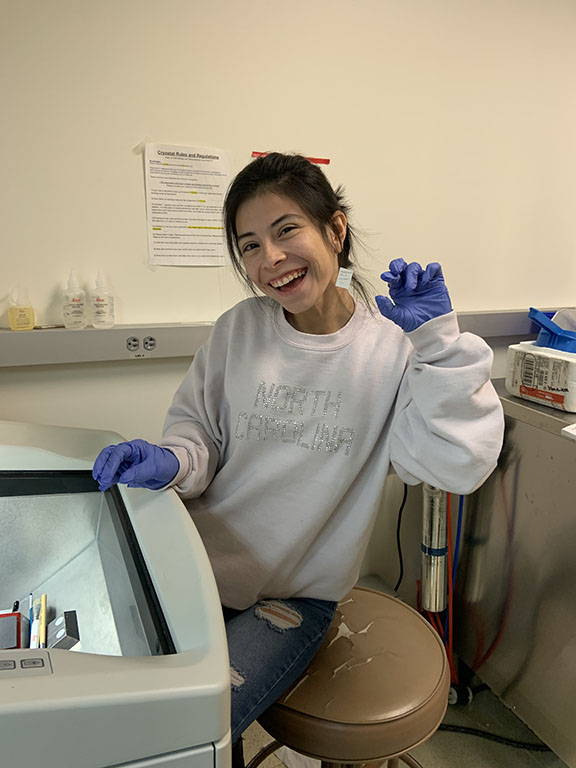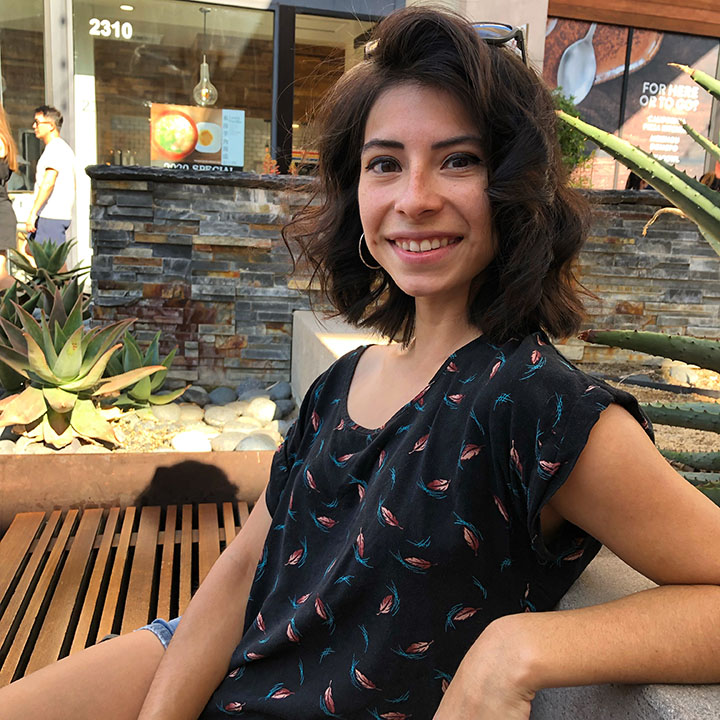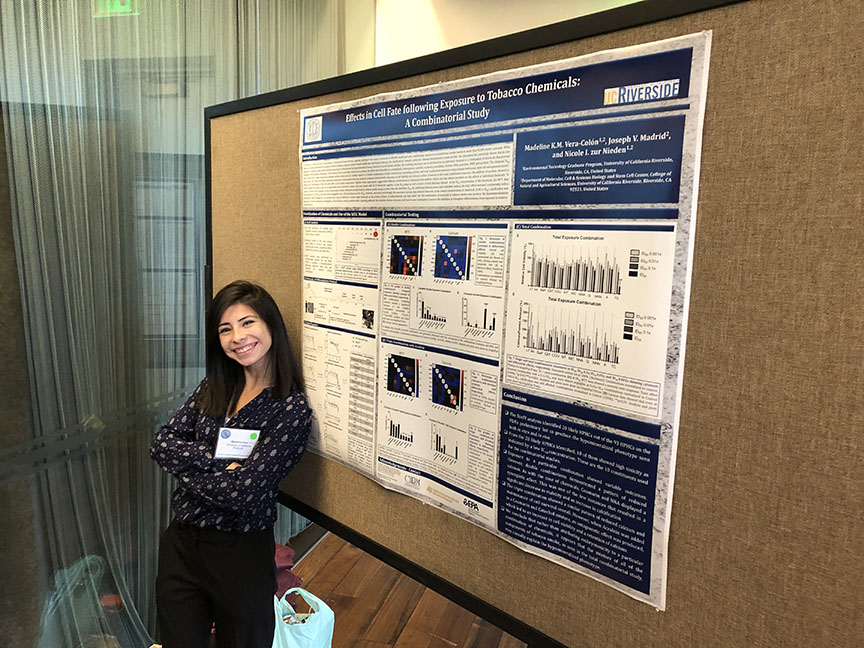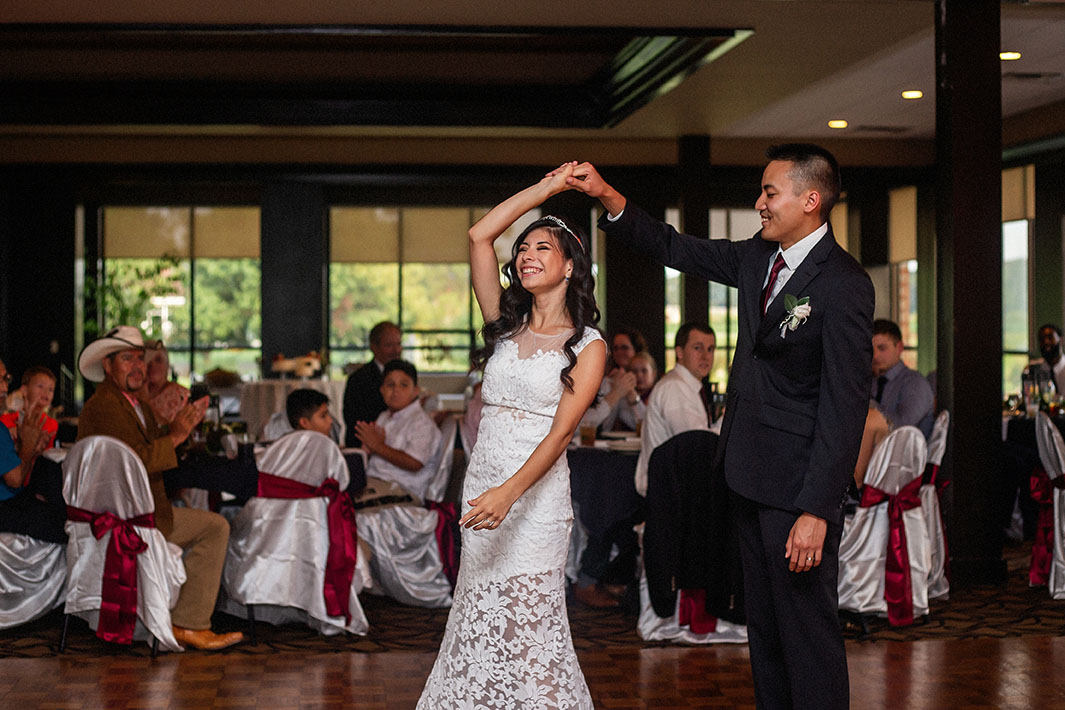Membership
Meet a Member
Madeline Vera-Colón
My name is Madeline Vera-Colón. I am a 4th year PhD student in the Environmental Toxicology graduate program at University of California, Riverside. I am a first-generation Mexican-American and college graduate.
What type of research do you do?
My dissertation project focuses on elucidating the effects of tobacco exposure on embryonic skeletal development. Our lab has previously found that exposure to tobacco in utero resulted in defects of the skeleton. In order to reduce animal testing, our lab utilizes a human embryonic stem cell differentiation protocol that reliably and reproducibly produces osteoblasts following a 20-day differentiation period. Therefore, we are able to recapitulate embryonic skeletal development using our in vitro differentiation model. Beyond identifying notable tobacco-induced skeletal phenotypes, I further assess the osteogenic molecular dysregulations altered by tobacco exposure. My goal is to develop a treatment plan that negates early, acute exposure to tobacco products.
Why did you join the Society for Birth Defects Research and Prevention?
An important aspect to science is being able to communicate and inform the public about your findings. Unfortunately, these opportunities are very few. However, conferences are an excellent way to determine your effectiveness as a communicator. I knew early-on I wanted to be involved in a smaller Society, with high-impact research—thus BDRP was a perfect choice. Within this Society, I am able to make connections from all over the globe, present research in a public setting, invite opportunities for discussion, and get involved in leadership aspects throughout BDRP.
What are some of the challenges you have encountered, and how did you address them?
Academia was not initially designed for scientists like me. I grew up the oldest child in a lower-middle class household in a very Southern small town in North Carolina. I am the first, first-generation Mexican-American in my family. My father migrated to the States from Mexico at the ripe age of 17, without being able to speak any English and only living on the dream that he would one day be able to support his family back home.
Having to navigate the cultural differences in my life versus that of my friends was a struggle in itself. My bi-racial family and I were constantly being judged for being different. Often times, throughout my schooling, I would get talked over as if my contributions were less than. I was the only person of color amongst my friends until high school. In fact, high school is where I met my now husband who was only 1 of 2 Asian students in our school. My husband and I faced similar circumstances and once graduating high school we began navigating academia together. He is currently a 4th year PhD candidate in Chemistry at Caltech.
It was difficult enough in school, however being in a family where neither parent pursued higher education felt like my future deck was stacked against me. Once beginning my bachelor’s, I knew very soon that I would need to support myself through my studies. This was probably the most difficult challenge to date, as I worked too much to study for my exams yet did not work enough to live comfortably. I recall often times eating one large meal a day in order to pay for remaining bills. Since I was going to school full-time, it was nearly impossible to find a job that would allow me to work off-peak hours while also setting aside time for sleeping and studying. I graduated in three years, while working multiple jobs. Despite this obstacle not being in my control, I found comfort in controlling my future. Although my parents did not have to means to help me while in school, both in my studies or financially, having a familial drive raises the stakes for my success. Dreams are difficult to measure, yet such an easy source of motivation. As cliché as it sounds, the sky really is the limit. Pursuing a higher education should not be this difficult and I want to make it easier for those following the same journey.
What would you describe as an amazing opportunity in your career?
The most amazing opportunity that I have encountered thus far in my career would be the opportunity to co-chair BDRP’s Diversity, Equity, and Inclusion workgroup. Leadership opportunities related to STEM in graduate school are a rare commodity, much less an opportunity at a Society-level. BDRP has been a great resource in my early career through annual meeting talks, opportunities to participate in committees, and open-ness for early-career-stage leadership opportunities. I am also grateful to have met two excellent scientists, my first year in graduate school, that introduced me to the Society and the formation of this new workgroup. They showed me the type of graduate student I wanted to be. Drs. Nicole Sparks and Lauren Walker were a postdoctoral fellow and a senior graduate student, respectively, when I joined the Environmental Toxicology graduate program at UCR. They are incredibly difficult to compete with but have been great role models and an excellent source of motivation. Thank you both for always being someone worth aspiring to be!




